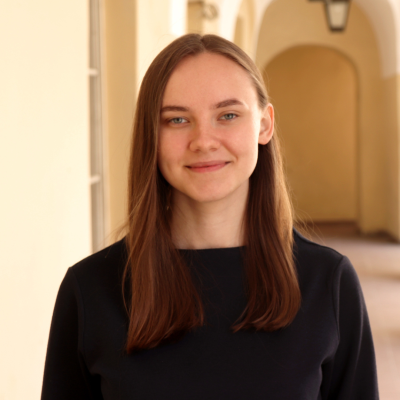
Neda Žutautaitė
VU SR President
“I sometimes laugh that I joined the programme (Public Policy Analysis) to better fulfill my responsibilities as the President of the VU SR in representing the students.”
You are studying in the Masters programme Public Policy Analysis, why did you choose this programme? What are your first impressions?
It was much easier to decide where to do a Master’s degree than when I chose a Bachelor’s degree. I realised that I was interested in public administration while studying Economics and Management at BA level, and taking advantage of distance learning opportunities (since I was studying in Kaunas), I exchanged some of the credits from my study programme to the Public Policy Analysis course for Bachelors at IIRPS. I had the opportunity to realise that I was really interested in studying this, so it wasn’t difficult to choose from the Master’s programme at Vilnius University (which I knew that I would continue studying here). And my first impressions really live up to my expectations – the programme is analytical, we are analysing the most relevant public policy issues of the moment, and I sometimes laugh that I joined the programme to better fulfill my responsibilities as the President of the VU SR in representing the students.
You are the President of the Vilnius University Students’ Representation, how did you discover this organisation, what is VU SR to you?
I knew about the student self-government even before I chose my studies. I saw a lot of meaning in representation – I had already started to do it in other organisations, so naturally I joined VU SR when I began studying at Vilnius University. And I only realised that VU SR is not just one of many organisations when I really saw how much students do for each other and to what extent the voice of Vilnius University students’ is listened to, both in the University and in education and youth policy. I see VU SR as the strongest and the largest student self-government in Lithuania, as one of the most active stakeholder groups in higher education policy, as an expert organisation that effectively represents students and strives for an open environment for every student at Vilnius University and their development in the VU community.
As the leader of the Students’ Representation, you uphold and implement the goals of the organisation that directly contribute to the well-being of the entire university community, which of the goals you are currently implementing are the most challenging?
This whole year has been full of challenges: from the aftermath of the COVID pandemic, to the conditions for returning to the University, from ensuring the quality of studies, to responding to the increased needs for mental health support.
The Russian war in Ukraine was another challenge that had to be responded to quickly. At the beginning of the summer, we were concerned about welcoming the arriving Ukrainian students, followed by the general problems of student accommodation in the major cities.
In this context, we as an organisation renewed our strategic action plan in the spring, with clear priorities on ensuring individualisation of the conditions for studies, the creation and activation of a system to promote student(s)’ self-expression, the equitable relationship between all members of the community, with a special focus this year on local and international students, and the concept of a Green University in order to respond to the man-made climate crisis and its consequences. I may be a bit critical, but I still see a number of challenges for the University to meet all these objectives in a definitive way.
And besides, you never know when a fast-burning crisis will strike that will require a response.
You are an active student representative, you work with the organisation’s community, you are a student: how do you manage to juggle all your activities, what does your day look like? Can you share some tips?
The last few years have taught me to plan my time very well. The formula is very simple – as the working hours of the University and other public institutions are quite standard, I usually spend part of my “working day” as a student representative, but the issues are different – sometimes we are approving the University’s budget, or during the parliamentary session, I am attending committee meetings to respond to proposals for changes in legislation, and sometimes I am organising seminars for students on stress and tension management during the session. After that, my day continues with lectures and seminars at the Institute, followed by preparation for the next day’s work – in the evenings, I am mostly inspired to write position papers and to develop a new project.
To share – the best way to plan my time is to prioritise my work according to a matrix of urgency and importance. And most of all, understanding that it is not possible to do everything at once. And then it becomes very clear where I want to focus my attention and what I am willing and able to do for the betterment of all students.
What would you like to wish the IIRPS VU community?
More courage to change. I think it is important that the community, whose mission is to educate a creative elite for Lithuania and the world, should not stop creating change both externally and sometimes is not afraid to change internally.


